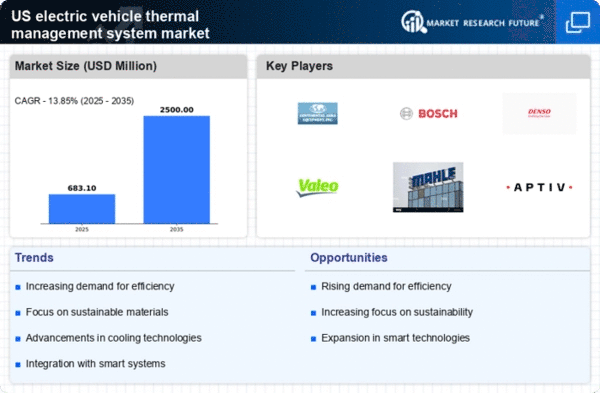Focus on Energy Efficiency
The growing emphasis on energy efficiency in the automotive sector is a significant driver for the electric vehicle-thermal-management-system market. As manufacturers strive to enhance the energy efficiency of electric vehicles, effective thermal management becomes crucial. In 2025, energy-efficient thermal management systems are expected to account for a substantial share of the market, as they contribute to improved vehicle range and performance. This focus on energy efficiency aligns with consumer expectations for sustainable and cost-effective transportation solutions, thereby driving innovation and investment in thermal management technologies.
Integration of Smart Technologies
The integration of smart technologies into electric vehicles is emerging as a key driver for the electric vehicle-thermal-management-system market. Advanced sensors and control systems enable real-time monitoring and management of thermal conditions, enhancing vehicle performance and safety. By 2025, it is anticipated that smart thermal management systems will capture a significant portion of the market, as they offer improved efficiency and reliability. This trend indicates a shift towards more intelligent and responsive thermal management solutions, which are likely to become essential components of modern electric vehicles.
Advancements in Battery Technology
The electric vehicle-thermal-management-system market is significantly influenced by advancements in battery technology. As battery capacities increase, the thermal management requirements become more complex. In 2025, the US battery market is expected to reach $30 billion, with a substantial portion allocated to thermal management solutions. Efficient thermal management systems are crucial for preventing overheating and ensuring the longevity of high-capacity batteries. This necessity drives manufacturers to develop sophisticated thermal management systems that can adapt to the evolving battery technologies, thereby fostering growth in the market.
Rising Demand for Electric Vehicles
The increasing consumer preference for electric vehicles (EVs) is a primary driver for the electric vehicle-thermal-management-system market. As more individuals opt for EVs, the need for efficient thermal management systems becomes critical to ensure optimal performance and safety. In 2025, the EV market in the US is projected to grow by approximately 30%, leading to heightened demand for advanced thermal management solutions. These systems are essential for maintaining battery temperature within optimal ranges, thereby enhancing battery life and performance. Consequently, manufacturers are investing in innovative thermal management technologies to meet this growing demand, which is likely to propel the market forward.
Government Incentives for EV Adoption
Government incentives aimed at promoting electric vehicle adoption play a pivotal role in the electric vehicle-thermal-management-system market. Various federal and state programs offer tax credits and rebates for EV purchases, which encourage consumers to transition from traditional vehicles. In 2025, it is estimated that these incentives could lead to a 25% increase in EV sales in the US. As the number of electric vehicles on the road rises, the demand for effective thermal management systems will likely increase, as these systems are essential for maintaining vehicle efficiency and safety. This trend suggests a robust growth trajectory for the market.
















